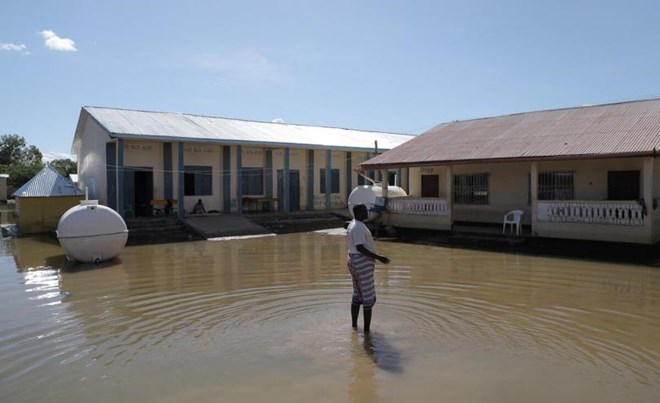
Thursday May 25, 2023

Flooding in Somalia has destroyed school buildings like this one. Photo by Awale Koronto/Save the Children.
MOGADISHU (Xinhua) -- Flash floods from heavy rains pounding Somalia have left more children vulnerable to malnutrition and disease outbreaks, a global charity said Wednesday.
Save the Children, a leading humanitarian organization for children, said flash floods have killed 22 people and left about 118,000 children and 101,000 adults homeless across Somalia.
These extreme weather events combined with ongoing conflict and surging food prices have left about 8.3 million people, nearly half of the population, in need of humanitarian assistance with more than 1.4 million people internally displaced, many living in camps.
"We are coming across families who have been hit by successive crises ranging from conflict to drought and now floods and this is taking a huge toll on them. Before the floods, children were on the brink of starvation as sequentially failed rains brought about the worst hunger crisis in 40 years," Save the Children's Country Director for Somalia Mohamud Mohamed Hassan said in a statement issued in Mogadishu, the capital of Somalia.
The charity said heavy rainfall in Somalia and the Ethiopian highlands had led to the worst flooding in 30 years in the central Somalia town of Beledweyne in the Hiran region with the Shabelle River bursting its banks.
The floods are the latest in a series of extreme weather events in recent years to hit Somalia, where children and communities find themselves at the sharp end of the global climate crisis.
"We are also calling for increased investment in climate change adaptation for communities in Somalia, including integrated water resources management and implementation of environmental regulation to mitigate the adverse impacts of the climate-induced crisis," he added.
The floods come after the worst drought in 40 years following five failed rainy seasons which has decimated livestock and destroyed crops, pushing the country to the brink of famine.
According to the UN, before the flooding about 6.5 million people were experiencing severe food insecurity and an estimated 1.8 million children facing acute malnutrition.
Mohamed said more funds are needed to provide food and critical healthcare services as well as to assess the damage, repair basic infrastructure, and develop long-term strategies to mitigate the impact of future floods.